James Comey, in an op-ed last week, demonstrated what a veteran instructor at the FBI Academy warned us about over the years: “First you’re good. Then you think you’re good. Then you’re no good.” He was trying to tell us not to get too proud of our own virtue, because it could lead us astray. Clearly it has with James Comey.
Comey was casted in a virtuous role during his time as deputy attorney general. When he subsequently served as FBI director, he was well liked by bureau employees for his humanitarian concerns. In his latest commentary, he continues to act the part that he alone is heroically protecting “our vital institutions” from unwarranted criticism.
As he has elsewhere, he describes the sole origin of the FBI’s counter-intelligence investigation of the Trump campaign as based on a report “from an allied ambassador” of an encounter in London between a Trump adviser and “a Russian agent.” That is his characterization of George Papadopoulos’ meeting with Joseph Mifsud, who told the then-Trump aide that the Russians had “dirt” on Hillary Clinton.
Comey tries to make his case stronger by branding Mifsud a Russian agent. That remains to be seen, as it is also plausible that Mifsud was a British or CIA asset. In that first encounter, there was no mention of emails. After the WikiLeaks dump, the emails were an assumption that both the “allied ambassador” and Papadopoulos himself made.
One conversation, relating a secondhand rumor, would never be enough predicate to justify opening a counterintelligence investigation of a U.S. person. That is the essence of the concern many of us, who served in and loved the FBI, hold. One off-handed conversation is not sufficient predicate to initiate a full counterintelligence investigation.
But Comey deflects and distracts from that concern by going back to the language of a few critics — in a sense, the straw men — who call the bureau treasonous and corrupt. Yes, the FBI is not and never was either of the two. But under Comey, it was poorly led. That is something he, so sure of his own goodness, may find hard to face.
Without naming Attorney General William Barr, Comey seems to attack Barr’s characterization of campaign spying. Comey’s semantic discussion of “spying” versus “surveillance” is rather silly. When American intelligence officials are assigned to an embassy, as I was, we expect to be surveilled, both electronically and physically. We have always called it spying. When our FBI follows or listens in on foreign diplomats assigned here, we call it surveillance.
Comey justifies the spying — electronic surveillance — of Carter Page, a U.S. citizen, by writing that a federal judge granted “permission.” It remains for Barr to discover what Comey’s FBI told that judge to gain permission.
In defending his decision to reopen the Clinton email investigation, Comey conveniently skipped over his initial usurpation of the prosecutor’s role in declining prosecution in that investigation. That usurpation could be described as his “then you’re no good” moment, as spelled out in Deputy Attorney General Rob Rosenstein’s memo justifying Comey’s firing.
The FBI is not corrupt, it is certainly not treasonous. But when Comey served as director, he allowed it to pursue investigations into one or more U.S. citizens without sufficient predicate. The semantics of spying, treason and corruption that Comey chooses to distract us with are not the issue. The issue is the lack of any justification for initiating the investigation.
Comey engages in a rant about the president of the United States at the outset of his column. But President Trump — pro or con — should not be the main concern. Our main concern should be the lack of any predicate in opening a counterintelligence investigation of a U.S. person — much less the campaign of a presidential candidate.
Comey’s indignant complaints about treason and corruption are an effort to distract us from a legitimate inquiry into some dangerous, faulty decisions made on his watch. He’s not that good, and the initiation of the counterintelligence investigation was no good.
Tom Baker (@BakeAssociates) served as an FBI special agent for 33 years. He served as the legal attaché at the American Embassy in Canberra, Australia, and in Paris, France.
The views and opinions expressed in this commentary are those of the author and do not reflect the official position of The Daily Caller.



